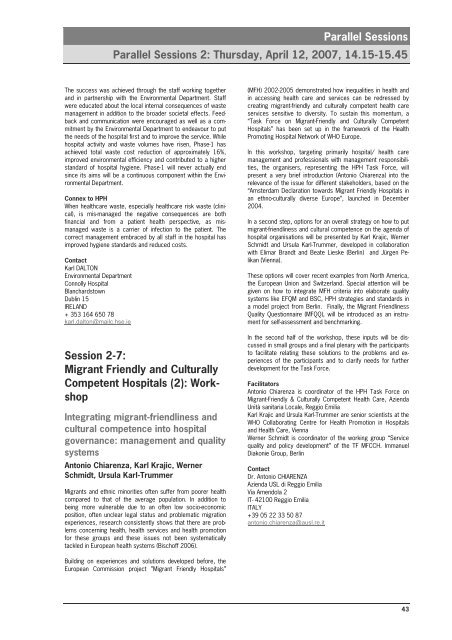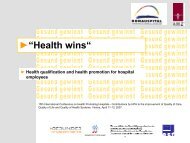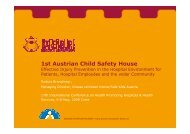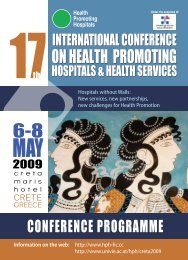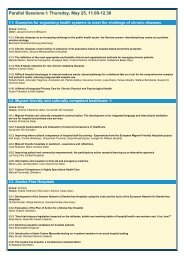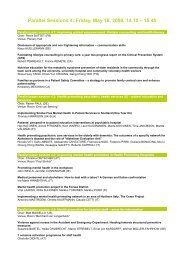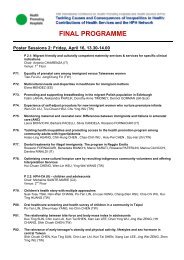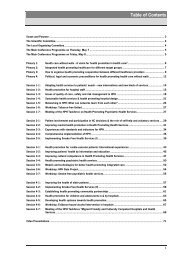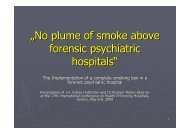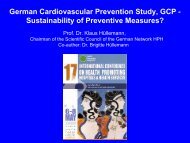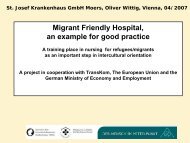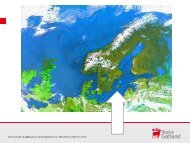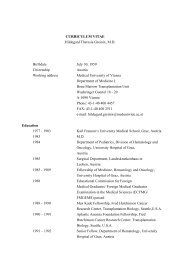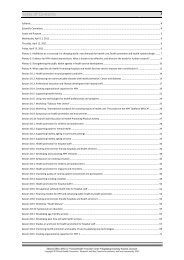Plenary 1: The Hospital – A Staff Empowering ... - HPH-Conference
Plenary 1: The Hospital – A Staff Empowering ... - HPH-Conference
Plenary 1: The Hospital – A Staff Empowering ... - HPH-Conference
Create successful ePaper yourself
Turn your PDF publications into a flip-book with our unique Google optimized e-Paper software.
Parallel Sessions<br />
Parallel Sessions 2: Thursday, April 12, 2007, 14.15-15.45<br />
<strong>The</strong> success was achieved through the staff working together<br />
and in partnership with the Environmental Department. <strong>Staff</strong><br />
were educated about the local internal consequences of waste<br />
management in addition to the broader societal effects. Feedback<br />
and communication were encouraged as well as a commitment<br />
by the Environmental Department to endeavour to put<br />
the needs of the hospital first and to improve the service. While<br />
hospital activity and waste volumes have risen, Phase-1 has<br />
achieved total waste cost reduction of approximately 16%,<br />
improved environmental efficiency and contributed to a higher<br />
standard of hospital hygiene. Phase-1 will never actually end<br />
since its aims will be a continuous component within the Environmental<br />
Department.<br />
Connex to <strong>HPH</strong><br />
When healthcare waste, especially healthcare risk waste (clinical),<br />
is mis-managed the negative consequences are both<br />
financial and from a patient health perspective, as mismanaged<br />
waste is a carrier of infection to the patient. <strong>The</strong><br />
correct management embraced by all staff in the hospital has<br />
improved hygiene standards and reduced costs.<br />
Contact<br />
Karl DALTON<br />
Environmental Department<br />
Connolly <strong>Hospital</strong><br />
Blanchardstown<br />
Dublin 15<br />
IRELAND<br />
+ 353 164 650 78<br />
karl.dalton@mailc.hse.ie<br />
Session 2-7:<br />
Migrant Friendly and Culturally<br />
Competent <strong>Hospital</strong>s (2): Workshop<br />
Integrating migrant-friendliness and<br />
cultural competence into hospital<br />
governance: management and quality<br />
systems<br />
Antonio Chiarenza, Karl Krajic, Werner<br />
Schmidt, Ursula Karl-Trummer<br />
Migrants and ethnic minorities often suffer from poorer health<br />
compared to that of the average population. In addition to<br />
being more vulnerable due to an often low socio-economic<br />
position, often unclear legal status and problematic migration<br />
experiences, research consistently shows that there are problems<br />
concerning health, health services and health promotion<br />
for these groups and these issues not been systematically<br />
tackled in European health systems (Bischoff 2006).<br />
Building on experiences and solutions developed before, the<br />
European Commission project ”Migrant Friendly <strong>Hospital</strong>s”<br />
(MFH) 2002-2005 demonstrated how inequalities in health and<br />
in accessing health care and services can be redressed by<br />
creating migrant-friendly and culturally competent health care<br />
services sensitive to diversity. To sustain this momentum, a<br />
“Task Force on Migrant-Friendly and Culturally Competent<br />
<strong>Hospital</strong>s” has been set up in the framework of the Health<br />
Promoting <strong>Hospital</strong> Network of WHO Europe.<br />
In this workshop, targeting primarily hospital/ health care<br />
management and professionals with management responsibilities,<br />
the organisers, representing the <strong>HPH</strong> Task Force, will<br />
present a very brief introduction (Antonio Chiarenza) into the<br />
relevance of the issue for different stakeholders, based on the<br />
“Amsterdam Declaration towards Migrant Friendly <strong>Hospital</strong>s in<br />
an ethno-culturally diverse Europe”, launched in December<br />
2004.<br />
In a second step, options for an overall strategy on how to put<br />
migrant-friendliness and cultural competence on the agenda of<br />
hospital organisations will be presented by Karl Krajic, Werner<br />
Schmidt and Ursula Karl-Trummer, developed in collaboration<br />
with Elimar Brandt and Beate Lieske (Berlin) and Jürgen Pelikan<br />
(Vienna).<br />
<strong>The</strong>se options will cover recent examples from North America,<br />
the European Union and Switzerland. Special attention will be<br />
given on how to integrate MFH criteria into elaborate quality<br />
systems like EFQM and BSC, <strong>HPH</strong> strategies and standards in<br />
a model project from Berlin. Finally, the Migrant Friendliness<br />
Quality Questionnaire (MFQQ), will be introduced as an instrument<br />
for self-assessment and benchmarking.<br />
In the second half of the workshop, these inputs will be discussed<br />
in small groups and a final plenary with the participants<br />
to facilitate relating these solutions to the problems and experiences<br />
of the participants and to clarify needs for further<br />
development for the Task Force.<br />
Facilitators<br />
Antonio Chiarenza is coordinator of the <strong>HPH</strong> Task Force on<br />
Migrant-Friendly & Culturally Competent Health Care, Azienda<br />
Unità sanitaria Locale, Reggio Emilia<br />
Karl Krajic and Ursula Karl-Trummer are senior scientists at the<br />
WHO Collaborating Centre for Health Promotion in <strong>Hospital</strong>s<br />
and Health Care, Vienna<br />
Werner Schmidt is coordinator of the working group “Service<br />
quality and policy development” of the TF MFCCH. Immanuel<br />
Diakonie Group, Berlin<br />
Contact<br />
Dr. Antonio CHIARENZA<br />
Azienda USL di Reggio Emilia<br />
Via Amendola 2<br />
IT- 42100 Reggio Emilia<br />
ITALY<br />
+39 05 22 33 50 87<br />
antonio.chiarenza@ausl.re.it<br />
43


